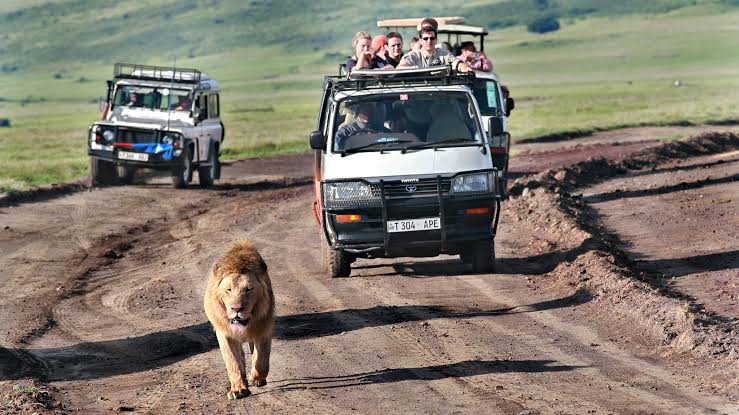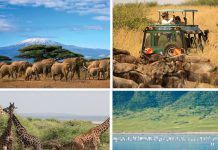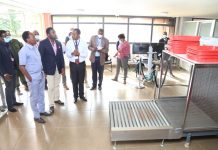Author: DIES NGOWI
AfricaPress-Tanzania: AS the world today celebrates the Tourism Day, Tanzania boasts of remarkable gains in terms of conservation and revenue accrued from the emerging key economic sector.
Reforms carried out in legal frameworks have enabled wildlife authorities to run paramilitary entities.
Tanzania, a land with abundant wildlife ranging from the towering elephant to the tiny mongoose and other major tourist attractions, marks this day with pomp and pageantry highlighting its theme ‘Tourism and Rural Development’.
The thrust of this theme centres on the unique role that tourism plays in providing opportunities outside of big cities and preserving cultural and natural heritage all around the world.
Tanzania National Parks (TANAPA) Senior Assistant Conservation Commissioner for Communication Mr Paschal Shelutete said yesterday that the event takes place today at the National College of Tourism (NCT) in Arusha to be officiated by Karatu District Commissioner Mr Abbas Kayanda. Speaking on the gains recorded in the tourism industry in the past five years, Ngorongoro Conservation Area Authority (NCAA) Conservation Commissioner, Mr Freddy Manongi said earnings have tremendously increased as the country records higher tourist arrivals.
He said that NCAA registered an increase of up to 150 per cent from 60bn/- in 2015 to 143bn/- last year.
“A lot has been achieved last year, but generally in the last five years revenue has increased to 150 percent,” said Mr Manongi.
The revenue has helped NCAA to upgrade infrastructure both on the entrance road and in the crater where major renovation and construction of roads has been completed to attract more tourists.
Renovations include the upscaling of the roads at the deep, volcanic crater that is the largest unflooded and unbroken caldera in the world.
The roads were destroyed by rains this year, raising the water level.
Mr Manongi said the law has since been changed to turn NCAA from a civilian paramilitary entity.
The move has made workers to become more disciplined and brave, triggering efficiency and diligence in conservation activities.
The head of infrastructure at NCAA Crater, Mr Humphrey Swai said the calavats cost 148m/- and are of standard quality, with 1.2 metre diameter while the past ones were of 600 millimetres.
He said that a short-term plan was being taken during the rainy season to rehabilitate damaged areas of the road and the long-term plan is to install the calavats and upgrade the roads as means to promote tourism within the Crater.
Ngorongoro is unique because it has multiple land use philosophy; maintaining the peaceful co-existence of human and wildlife in a natural and traditional setting.
Pastoralism, conservation of natural resources and tourism are the three, main components that are given equal consideration in policy shaping decisions.
Having opted for no lockdown amid Covid-19 pandemic and eventually opening up her skies on June 1, the tourism sector season opened with huge number of tourists jetting in, starting with the landing at the Kilimanjaro International Airport (KIA) of Ethiopian Airways plane with tourists who were destined to Arusha, Manyara and Zanzibar.
The opening of the season was graced by Minister of Natural Resources and Tourism Dr Hamisi Kigwangala.
Dr Kigwangala commended the Kilimanjaro Airports Development Company ( KADCO) management, TANAPA, NCAA, Tanzania Association of Tour Operators and other stakeholders for efforts taken during the low tourism season, by putting in place conducive environment for recommence of the high season.
This year also saw Serengeti National Park becoming one among the few national parks in the world with high number of hashtags on Instagram.
Serengeti is the only one in East Africa to appear in the National Parks List and the second one after Kruger of South Africa which became the 12th in the World.
World Tourism Organisation (UNWTO) Secretary General Mr Zurab Pololikashvili, speaking of this year’s theme, noted that tourism should help rural communities hold onto their unique natural and cultural heritage, supporting conservation projects, including those safeguarding endangered species, lost traditions or flavours.
‘Tourism and Rural Development’ celebrates the sector’s unique ability to drive economic development and provide opportunities outside of big cities, including in those communities that would otherwise be left behind.
For many rural communities, tourism means opportunity.
It provides jobs and economic empowerment, including those for women and youth.
Last year Tanzania received 1,527,230 tourists and generated more than $2.6bn that comprises of more than 25 per cent of the total export earnings.
The sector supports nearly 1.6 million direct and indirect jobs.
In June this year Tanzania launched national Standard Operating Procedures (SOPs) for management of post Covid-19 in the business operations in the sector.
The basic targets of the guidelines are to ensure that tourists who enter the country do not bring in or contract the virus, service providers remain safe and the tourists leave the country safe after their holiday businesses.







